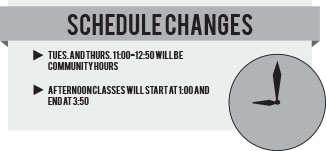Beginning next fall, Grinnellians can expect a change in their course meeting times.
Faculty, with the input of students and staff, voted to change the class timetable to have afternoon classes begin at 1 p.m. and end by 3:50 p.m. as well as to allocate four ‘community hours,’ when no classes will meet.
The current schedule has only been in place since the fall semester of 2012 and was meant to be a two-year trial period, though it was renewed for this school year. Associate Dean and Professor Maria Tapias, Anthropology, credits Jason Maher, the College’s new registrar, as a key pioneer in these changes.
“Our new registrar, Jason, really provided a fresh pair of eyes that we welcomed,” Tapias said. “When you’ve been doing things a certain way you say, ‘I don’t know what other possibilities there are.’”
A primary goal for Maher was to provide more options and possibilities to the schedules, which had been frequently requested by the College’s faculty.
“There was a faculty class block survey that happened April-May of 2014 and we learned a lot from that. It was actually a fairly well-returned survey,” Maher said. “People wanted the old [11 a.m.] convocation time back. It was clear that there was a request for more community time on campus, for more class blocks, for more diversity in the schedule, more, more, more was kind of the message we got.”
 In addition to Maher’s new perspective, Tapias and representative to the Curriculum Committee from the Science Division Joanna Silverman ’15 noted the nostalgia for the previous schedule, which was in effect from 1983 to 2012, regarding how convocation was scheduled. Before fall 2012, convocation took place at 11 a.m. and ran until 1 p.m., but since then convocation has been shortened to one hour of time on Wednesdays. Silverman noted the desire for an opportunity to increase audience participation during convocation.
In addition to Maher’s new perspective, Tapias and representative to the Curriculum Committee from the Science Division Joanna Silverman ’15 noted the nostalgia for the previous schedule, which was in effect from 1983 to 2012, regarding how convocation was scheduled. Before fall 2012, convocation took place at 11 a.m. and ran until 1 p.m., but since then convocation has been shortened to one hour of time on Wednesdays. Silverman noted the desire for an opportunity to increase audience participation during convocation.
“One area that we talked about in Curriculum Committee was the fact that whenever we have an event or whenever we have a convo speaker, it will take up 95 percent of that [one hour] slot and any area or potential for discussion on that topic is lost because people either have to leave earlier or jet off to class, so you essentially lose that sense of community,” Silverman said.
Silverman noted that when convocation took place at 11 a.m. in her first year, there seemed to be more people in attendance and more people who stayed until the end of the event. Tapias noted that this addition of community hours is not just for convocation. Her hope is that the new time will open up opportunities for different types of campus-wide events.
“When we starting thinking about it, [we thought] ‘Okay, what are some of the possibilities for this community time?’ One of the things we started talking about wanting to have is a bigger scale, undergraduate symposium for research … a research week, so to speak,” Tapias said. “Another possibility would be to think about maybe some sort of advising week or some sort of second- or third-year retreat or something like that.”
However, there are no definite plans for this time slot and Tapias suspects the Dean will assign a task force to brainstorm different ways to utilize this new time.
Another key change made to the schedule was to afternoon classes. The change to have classes start at 1 p.m. was primarily to standardize class times and utilize classroom spaces.
“By creating these standard start times, [classes are] not so staggered out and we’re taking rooms offline and that helps with student conflicts too when you’re trying to build your schedule,” Maher said.
Ending classes at 3:50 p.m. would also allow student athletes more time to make it to practice and faculty enough time to hold meetings without running past time. Maher and Tapias added that often faculty members need to pick up their children from daycare by 5 p.m. Tapias also pointed to the fact that they would have to be compensated for any time they stay after 5 p.m.
A change that was not approved into the new timetable was a 12 p.m. to 1:50 p.m. that could take place on a combination of days on Monday, Wednesday and Friday.
“Mostly I focused on this 12 to 1:50 time slot that was a big area of controversy, mostly because there is the potential for students to run straight through the middle of the day, lunch hour, nonstop. So on the students’ behalf, basically my area of concern, it was an overwhelming negative,” Silverman said. “That wasn’t actually [a] uniform response, though, in some of the other divisions. It was kind of a mixed review.”
Overall, the changes to the timetable are meant to offer more possibilities to faculty and students, both in terms of courses and events, as well as to address areas of concerns from different groups. This new timetable, unlike the current one, will not have a trial run and will be in effect until a new schedule is proposed.























































